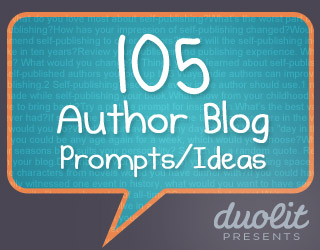 So, you started your author blog. It was so *exciting* at the beginning! Rainbows and sunshine poured down on you and the posts flowed freely from your fingertips. There was no shortage of ideas and you just knew this blogging thing was meant for you.
So, you started your author blog. It was so *exciting* at the beginning! Rainbows and sunshine poured down on you and the posts flowed freely from your fingertips. There was no shortage of ideas and you just knew this blogging thing was meant for you.
Fast-forward to a month later. You visit your blog and think, “has it really been *that* long since I’ve posted?” We understand — we’ve had our share of blogging lapses in 2+ years here at Duolit. How do we combat this? Ideas…lots and lots of ideas. We offered up 20 or so author blog ideas awhile back, but thought it was time for something more…dramatic.
Like ONE HUNDRED AND FIVE AUTHOR BLOG PROMPTS! *cue exciting, dramatic music*
Oh yes. We came up with idea after idea until we ran out of juice (read: passed out from exhaustion) — and here’s the results.
Self-Publishing Related Blog Prompts
- What do you love most about self-publishing?
- What’s the worst part of self-publishing?
- How has your impression of self-publishing changed?
- Would you recommend self-publishing to other authors?
- What will the self-publishing industry look like in ten years?
- Review your publisher and publishing experience. What did you like? What would you change?
- 5 Things you’ve learned about self-publishing.
- 4 Self-published authors you look up to.
- 3 Ways indie authors can improve self-publishing.
- 2 Self-publishing resources every indie author should use.
- 1 mistake you made while self-publishing your book.Continue Reading
 Many moons ago, I eagerly planted myself in the front row of a Florida State classroom for my first day of a public relations writing class. I was two semesters into my third major in college and pretty stoked about learning the core of the skill set I would need to secure a job post-grad. A lifelong, self-identified writer, I was certain the class would be an easy A and took pity on my classmates for what I assumed were their inferior writing skills.
Many moons ago, I eagerly planted myself in the front row of a Florida State classroom for my first day of a public relations writing class. I was two semesters into my third major in college and pretty stoked about learning the core of the skill set I would need to secure a job post-grad. A lifelong, self-identified writer, I was certain the class would be an easy A and took pity on my classmates for what I assumed were their inferior writing skills. Okay, follow-up question time: What’s the TP of your novel?
Okay, follow-up question time: What’s the TP of your novel? We're
We're 








